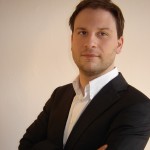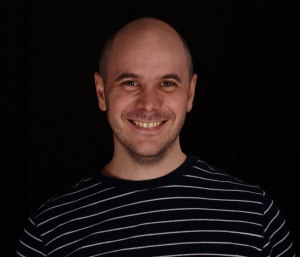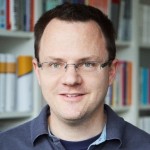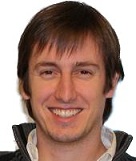Educational Data Mining liefert einen neuen, evidenzbasierten Beitrag zur Bildungsforschung.
Mit Methoden der Informatik und Statistik können Muster in Datenmengen erkannt werden, die andernfalls unentdeckt bleiben würden. Diese wiederum liefern – im Kontext der Informatikdidaktik angewendet – wichtige Informationen für den Informatikunterricht. Vorgestellt wird eine Forschungsmethode, die auf der automatischen Auswertung einer großen Menge von Begriffsnetzen basiert. Präsentiert werden sowohl Ergebnisse aus abgeschlossenen Studien wie auch weiterführende Forschungsfragen.
Ein zweiter zentraler Aspekt meiner Forschungstätigkeit befasst sich mit der Entwicklung und Validierung von Messinstrumenten für die Informatikdidaktik. Vorgestellt wird der Zwischenstand der aktuellen Forschung zu einem Instrument für Kontrollstrukturen.
Inter- und transdisziplinäre Unterrichtskonzepte in der Informatik
1. April 2015
Dem Unterrichtsfach Informatik mangelt es an standardisierter Kompetenzorientierung und den dahinterstehenden fundamentalen Ideen bzw. ändern sich diese durch Paradigmenwechsel häufig. Als Kulturtechnik kann die Informatik auch nicht isoliert betrachtet werden.
Künftige Forschungsherausforderungen sind demnach auch die Auswirkungen auf und die Anwendung in anderen Fächern. Es bedarf der Entwicklung von Unterrichtskonzepten und -werkzeugen, die moderne Informationstechnologien mit kreativen und spielerischen Ansätzen verbindet. Zudem soll untersucht werden, welche Auswirkungen der Trend weg von naturwissenschaftlichen hin zu Schulen mit sprachlich-kreativen Schwerpunkten auf das Fach Informatik hat und ob diese Entwicklung tatsächlich den Bedürfnissen der Schüler_innen gerecht wird.
Posted in TEWI-Kolloquium Kommentare deaktiviert für Inter- und transdisziplinäre Unterrichtskonzepte in der Informatik
Empirical Results on Cloning and Clone Detection
30. März 2015
 Abstract: Cloning means the use of copy-paste as method in developing software artefacts. This practice has several problems, such as unnecessary increase of these artefacts, and thereby increased comprehension and change efforts, as well as potential inconsistencies. The automatic detection of clones has been a topic for research for several years now and we have made huge progress in terms of precision and recall. This led to a series of empirical analyses we have performed on the effects and the amount of cloning in code, models and requirements. We continue to investigate the effects of cloning and work on extending clone detection to functionally similar code. This talk will give insights into how clone detection works and the empirical results we have gathered.
Abstract: Cloning means the use of copy-paste as method in developing software artefacts. This practice has several problems, such as unnecessary increase of these artefacts, and thereby increased comprehension and change efforts, as well as potential inconsistencies. The automatic detection of clones has been a topic for research for several years now and we have made huge progress in terms of precision and recall. This led to a series of empirical analyses we have performed on the effects and the amount of cloning in code, models and requirements. We continue to investigate the effects of cloning and work on extending clone detection to functionally similar code. This talk will give insights into how clone detection works and the empirical results we have gathered.
Short CV: Stefan Wagner is full professor for software engineering at the University of Stuttgart. He holds a PhD in computer science from TU Munich, where he also worked as a post-doc. His main research interests are quality engineering, requirements engineering, agile software development and safety engineering; all tackled using empirical research.
Posted in TEWI-Kolloquium Kommentare deaktiviert für Empirical Results on Cloning and Clone Detection
Image and Video Retargeting for Mobile Devices
15. Februar 2015
The talk addresses the challenge of image and video visualization on mobile devices. Nowadays, mobile devices like tablets or smartphones are widely used for the capturing and the visualization of multimedia data. The resolution of the display and of the captured pictures does typically not match, and the image content is thus scaled down when presented. This may cause a significant loss in picture quality, where details are no longer recognizable. Also, scaling does not work well when the aspect ratios of the picture and the screen differ. Unnaturally stretched objects are a result. On the contrary, image and video retargeting techniques like seam carving or warping only modify non-relevant image areas and preserve the most important visual content.
The talk presents state-of-the-art algorithms for image and video retargeting. These methods identify and preserve important objects in images and videos, combine different retargeting operators, and – in the case of video retargeting – avoid temporal inconsistencies. Extensions for stereoscopic images and videos are discussed as well.
Short CV: Dr. Stephan Kopf received his diploma in business informatics (2000) and his Ph.D. in computer science (2007) both from the University of Mannheim (Germany). He completed his habilitation (postdoctoral lecture qualification) in 2012 and is currently working as senior researcher and lecturer at the Department of Networks and Multimedia at the University of Mannheim. His research focuses on multimedia content analysis, media retargeting, high dynamic range video, shape-based object recognition, and digital video watermarking. He has published over 80 refereed journal and conference papers in these fields. Dr. Kopf received the best paper award at the ACM Multimedia Systems conference in 2014. He served as technical program chair of ACM ICIMCS, as guest editor of MTAP, and on the program committee of several conferences and workshops. He is a member of IEEE, ACM and ACM SIGMM.
Posted in TEWI-Kolloquium Kommentare deaktiviert für Image and Video Retargeting for Mobile Devices
UW-OFDM: Non-linear Receivers
19. Januar 2015
Abstract:
The engineering world is mostly made up from the reuse, reinvention or reapplication of old knowledge, rather than single groundbreaking new findings. Each small advance contributes to human knowledge with an impact that can’t be seen usually until many years later.
As an example, a research summary of non-linear receivers for Unique Word OFDM (orthogonal frequency division multiplexing) is presented, where several data detection techniques for MIMO (multi-antenna) communication systems are reused for a single-antenna setup. This is enabled by the UW-OFDM concept, which opens the range from Bayesian linear data estimation to maximum likelihood detection, opposing to the formerly dull data detection method for classical OFDM.
As an industry example, the limiting factors of the signal sensitivity in FMCW (frequency modulated continuous wave) Radar transceivers are addressed. The problem of on-chip leakage is an inherent problem of signal processing in MMICs (monolithic microwave integrated circuits). How it has been handled in communication ICs might be a clue for how to remarkably enhance FMCW Radar in the future.
Biography:
Alexander Onic is currently Concept Engineer for automotive Radar at Infineon Technologies in Linz, Austria. He received the doctoral degree from Alpen-Adria-Universität Klagenfurt in 2013, where he was part of the research team that invented Unique Word OFDM, a novel signaling scheme for digital communication. In 2007, he graduated with the Dipl.-Ing. degree from Friedrich-Alexander-Universität Erlangen-Nürnberg, after studying electrical engineering with an emphasis on information technology and signal processing. Alex‘ research interest in signal processing, communication engineering and estimation theory is consequently supplemented by the research cooperation of Infineon and Johannes-Kepler-Universität Linz on Radar signal processing topics.
Posted in TEWI-Kolloquium Kommentare deaktiviert für UW-OFDM: Non-linear Receivers
„BigMedia“: Multimedia goes Big Data
14. Januar 2015
Abstract:
Ever more multimedia data gets produced, stored, and shared. This is a well-known phenomenon and quite common for information technology, one might say, but multimedia as a field of computing has always been aiming at humans rather than computers as ultimate consumers: computing was mostly an auxiliary on the path from media creation to human consumption. Despite increasing automation, human consumption is likely to remain the dominating multimedia use case. Since humans have rather fixed sensing and processing capabilities, the dramatic increase in multimedia data production and online availability poses particular “ multimedia big data“ challenges – the more so since the characteristics of multimedia make the well-known „four V“ of big data particularly virulent.
In light of the aforementioned development, the talk will look at big data challenges for multimedia and at upcoming approaches to meeting these challenges. The problem space will be structured according to an imaginary „processing pipeline“ that starts from media capturing via networking and storage/processing until presentation/consumption. Some nonfunctional aspects such as privacy will be addressed, too.
Biography:
Max Mühlhäuser is a Full Professor of Computer Science at Technische Universität Darmstadt, Germany, and head of the Telecooperation Lab. In 1986, he received his Doctorate from the University of Karlsruhe and soon afterwards founded the first European research center for Digital Equipment Corp. (DEC). Since 1989, he worked as either professor or visiting professor at universities in Germany, Austria, France, Canada, and the US. Max published more than 450 articles, co-authored and edited books about Ubiquitous Computing, E-learning, and distributed & multimedia software engineering. Max is deputy speaker of a nationally funded cooperative research center on the Future Internet and directorate member of the Center for Advanced SEcurity research Darmstadt (CASED).
Posted in TEWI-Kolloquium Kommentare deaktiviert für „BigMedia“: Multimedia goes Big Data
Privacy and Security Challenges in the Smart Grid User Domain
12. Januar 2015
The term „smart grids“ is used to describe the next-generation intelligent energy systems. Smart grids employ state-of-the-art information and communication technology to control generation, distribution and consumption of energy. The degree of information needed on network status is vastly more accurate compared to traditional power networks, and needs to be available in fine granularity in near real-time. The availability of such fine-grained data raises severe privacy concerns in the end-user domain. For example, the application of non-intrusive load monitoring techniques to high-resolution load profiles allows inferring details on user behavior such as presence, sleep-and-wake cycles and the brands of used appliances. Another challenge in the widespread adoption of smart grid technologies lies in the domain of security. Recent reports of smart meters that can easily be hacked and used to remotely control energy availability in the connected household have not helped to increase user trust. In this talk, the main challenges in the area of smart grid privacy and security from an end-user perspective will be reviewed. At the example of smart metering, selected solutions will be discussed in detail.
Dominik Engel is a professor at the Salzburg University of Applied Sciences in Austria, where he heads the Josef Ressel Center for User-Centric Smart Grid Privacy, Security and Control. He holds a PhD degree in Computer Science from the University of Salzburg. Prior to joining Salzburg University of Applied Sciences, Dominik Engel was a researcher at the Universities of Bremen and Salzburg and product manager at Sony DADC, where he was responsible for video content security. His research interests include smart grid security, multimedia security and technological methods for enhancing end-user trust.
Posted in TEWI-Kolloquium Kommentare deaktiviert für Privacy and Security Challenges in the Smart Grid User Domain
Efficient retrieval using models based on feature signatures
10. November 2014
Abstract: Recent trends in large-scale image retrieval consider image representations based on the Bag of Visual Words model, because such representation enables efficient filtering using inverted files, while for more effective retrieval the representation can be enhanced by VLAD or Hemming embedding. In order to improve the effectiveness of the retrieval even more, some models try to relax from Bag of Visual Words model (i.e., from a shared feature space dictionary) and model content of multimedia objects by means of so-called feature signatures. Whereas the effectiveness of models based on feature signatures seems to be promising for several retrieval tasks, the efficiency of the models still represents a serious performance bottleneck, because the models employ expensive adaptive distance measures to compare two feature signatures. In this talk, we present several recent approaches that significantly improve the efficiency of the retrieval when using models based on feature signatures, making the models applicable also for large-scale image retrieval.
CV: Jakub Lokoc received the doctoral degree in software systems from the Charles University in Prague, Czech Republic. He is an assistant professor in the Department of Software Engineering at the Charles University in Prague, Faculty of Mathematics and Physics, Czech Republic. He is a member of siret research group and his research interests include metric access methods, multimedia retrieval and exploration, and similarity modeling.
Posted in TEWI-Kolloquium Kommentare deaktiviert für Efficient retrieval using models based on feature signatures
CONTINUOUS TIME BAYESIAN NETWORKS FOR MINING STREAMING DATA
3. November 2014
Abstract: Streaming data are relevant in finance, computer science, and engineering while they are becoming increasingly important in medicine and biology. In particular, classification, clustering and structural learning of streaming data are receiving increasing attention. These tasks require algorithms and models capable to represent dynamic, sequence and time. Dynamic Bayesian networks and hidden Markov models are used to analyze streaming data. However, these models are concerned with equally spaced time data and thus suffer from several limitations because it is not clear how to discretize timestamps. The talk introduces continuous time Bayesian networks and continuous time Bayesian networks classifiers. Algorithms for parametric and structural learning of continuous time Bayesian network models to solve classification, clustering and structural learning based on multivariate discrete state continuous time trajectories are described. Stationary and non-stationary continuous time Bayesian networks are presented together with their structural learning based on the marginal likelihood approach. Numerical experiments concerning real world applications in finance, biomedicine, neurology and biology are presented.
CV: Prof Fabio Stella is an associate professor at the Dipartimento di Informatica, Sistemistica e Comunicazione of the Università degli Studi di Milano-Bicocca. His research focuses on models and algorithms for data analysis and decision making under uncertainty in the areas of Business Intelligence, Data and Text Mining and Computational Finance. In the winter term 2014/15 he is giving the course 625.605 – Business Intelligence in Klagenfurt.
Posted in TEWI-Kolloquium Kommentare deaktiviert für CONTINUOUS TIME BAYESIAN NETWORKS FOR MINING STREAMING DATA
Quality of Experience – Why Bother?
15. Oktober 2014
 Abstract: In this talk I’ll discuss some ideas about the reasons, both technical and business-related why we care about Quality of Experience (QoE). I’ll present some results related to QoE-driven network and application-level management, and first steps into economically exploiting QoE models, in particular concerning Service Level Agreements, as well as some enablers for doing so.
Abstract: In this talk I’ll discuss some ideas about the reasons, both technical and business-related why we care about Quality of Experience (QoE). I’ll present some results related to QoE-driven network and application-level management, and first steps into economically exploiting QoE models, in particular concerning Service Level Agreements, as well as some enablers for doing so.


